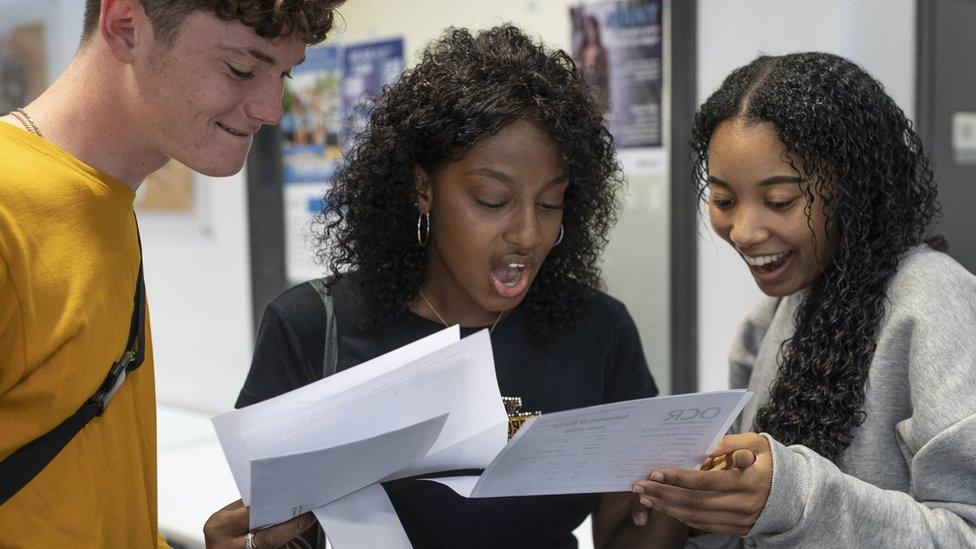Richer parents pressure teachers on exam grades
- Published
- comments

Teachers have faced lobbying from some parents over this year's grades, suggests research by a leading social mobility charity
Parents of pupils in private schools or living in affluent areas of England were the most likely to put pressure on teachers over exam grades, suggests research from the Sutton Trust., external
Almost a quarter of private school teachers had been contacted by parents over A-level and GCSE grades, twice as many as in schools in deprived areas.
Teachers submitted grades this year after exams were disrupted by Covid.
Head teachers warned such lobbying was "inappropriate" and added stress.
'Sharpest elbows'
The research, based on a survey of 3,200 teachers, showed teachers in private schools came under the greatest pressure, with the highest number, 23%, reporting parents contacting them over exam grades.
But there was also a social gap between state schools, with 17% of teachers in better-off areas facing pressure from parents, compared with 11% in disadvantaged areas.
Geoff Barton, leader of the ASCL head teachers' union, said parents lobbying for their children "think they are doing the best for their children, but it is yet another issue which has added to the stress of an extremely stressful period".
But he reassured students that grades were based on objective evidence - "rather than whose parents have the sharpest elbows".
Mr Barton had previously warned the education select committee that some parents were threatening to involve lawyers over grades and that schools were expecting a "huge number of appeals".

A-level and GCSE results will be published in a couple of weeks
Schools submitted their judgements on grades last month - and the final results will appear in a couple of weeks, with forecasts of an increase in top grades, which could put pressure on university places.
Researchers found that half of students applying to university were worried that the disruption caused by the pandemic and the replacement grading system would negatively affect their chance of getting into their first choice university.
But Paul Whiteman, leader of the National Association of Head Teachers, said parents and students should be confident of the fairness and "rigour of this year's awarding processes and understand that it is inappropriate to put pressure on staff".
Missed grades
Schools have been able to use a range of evidence for grades, including "mini-exam" test papers, mock exams, homework and coursework - after the usual set of full exam papers were cancelled.
The study from the Sutton Trust charity, which champions social mobility, shows how much variation there has been. Typically three or four "mini-exams" taken, but there were some schools taking more than six, while others were taking one, two or none at all.
There were also warnings of the difficulties facing some pupils when they were studying from home - such as a lack of space to work and problems with internet connections and equipment.
The report calls on universities to give extra consideration to students from disadvantaged backgrounds who narrowly missed their required grades.
And there is a warning that this year's new students will need more support to settle in, after so many difficulties from the pandemic and when students might not have been able to visit universities on open days.
"This year's cohort of university applicants have faced almost two years of disrupted education. As we approach results day, it's vital that poorer students are not disadvantaged by the greater impact of the pandemic on them," said Sutton Trust founder Sir Peter Lampl.
He also backed suggestions to change the timetable for university applications, so that students could apply once they knew their grades.
A Department for Education spokeswoman said: "Students have only been assessed on what they had been taught, supporting students who may not have had the opportunity to learn as much as they would do in a normal year and meaning that teachers have effectively made their assessments based on every student having their best day.
"No teacher should be put under undue pressure and grades are subject to wider internal checks in schools and external checks by exam boards to make sure they are a fair reflection of students' work."